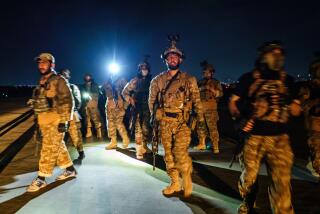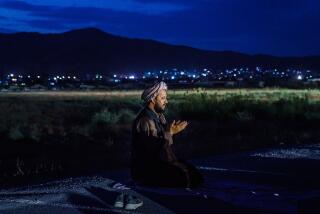Afghan Regime Likely to Fall, Soviet Asserts
- Share via
MOSCOW — Afghanistan’s ruling Communist party is so remote from the people and so divided by its internal bickering and factional rivalries that it remains in power only through the support of the Soviet Union, a former senior Soviet military adviser to the Afghan government was quoted Sunday as saying.
Maj. Gen. Kim M. Tsagolov, breaking with optimistic assessments by other Soviet officials of the prospects for the People’s Democratic Party of Afghanistan, said he expects the present government to collapse if its forces suffer major military defeats at the hands of Muslim insurgents after the withdrawal of Soviet troops from the country.
Tsagolov told the Soviet weekly magazine Ogonyok that a multifaceted civil war is likely and that the most probable outcome, at least temporarily, is a fundamentalist Islamic regime on the Soviet Union’s sensitive southern border.
“We can expect a hardening of Islamic resolve in close connection with the idea of an Islamic revolution,” Tsagolov said. “Quite possibly, Islamic fundamentalists will emerge at the fore.
“But (the fundamentalists’) time cannot be prolonged, for the economic necessities of development, the demands for socioeconomic progress will eventually gain the upper hand.”
American and some other Western diplomats in the region have predicted for some time that the Afghanistan army--trained and equipped by the Soviet Union--will not be able to fight off the moujahedeen , the Muslim guerrillas who have been trained in Pakistan and armed by the United States, China and other countries.
But Tsagolov, who served as a military adviser in Afghanistan from 1981 to 1984 and again last year, was the first senior Soviet officer to break with Moscow’s confident prediction that the Kabul government now has an effective fighting force and no longer needs Soviet military support.
His candid comments, even in a magazine noted for its avant-garde political position, reflect a growing feeling among Soviet political observers that even greater conflict may be in store for Afghanistan--and Moscow’s need to prepare public opinion here for yet another setback for its Afghan policy.
A struggle for dominance has already developed among rival insurgent groups, Tsagolov noted, as well as between the rebels and government forces.
Lt. Gen. Boris Gromov, the current Soviet commander in Afghanistan, told The Times in an interview last month that Afghan troops were holding their own against the guerrillas and that he had no doubts about their ability to hold off the insurgents after the Soviet withdrawal is completed in early 1989.
Tsagolov dissented vigorously in the Ogonyok article. “If you judge the Afghan army by its current state, then I do not have that confidence,” he said.
Soviet officials, he charged, had repeatedly exaggerated not only Afghan government victories but also had overdramatized those of Soviet troops.
The Afghan army is weak, Tsagolov said, because the ruling People’s Democratic Party and the government, now proclaimed to be one of “national reconciliation,” have always lacked popular support and have underestimated the threat of the internal armed opposition.
The Soviet Union began withdrawing its troops from Afghanistan on May 15. Under the terms of an agreement between Afghanistan and Pakistan that was guaranteed by the Soviet Union and the United States, half of Moscow’s troops--reported as 100,300 by Soviet officials and estimated at 115,000 by U.S. officials--must be out by Aug. 15, and the rest by Feb. 15.
35,000 Troops Withdrawn
The official Tass news agency said over the weekend that more than 35,000 soldiers have been withdrawn, and the Soviet foreign and defense ministries strongly denied allegations by Pakistan’s President Zia ul-Haq that Moscow had halted its withdrawal and, in fact, had sent some troops back to protect Kabul from moujahedeen attacks.
Senior Soviet officials have warned, however, that Moscow would reassess the situation in Afghanistan in early August and might decide to slow the troop withdrawal if Pakistan and the United States continued their support for the insurgents at present levels.
Afghanistan’s President Najibullah said in recent Soviet interviews that he is counting on the continued help of Soviet advisers for his 50,000 regular army troops after Soviet troops are gone. He has said his forces can defend the country as long as outside assistance to the moujahedeen is stopped.
More to Read
Sign up for Essential California
The most important California stories and recommendations in your inbox every morning.
You may occasionally receive promotional content from the Los Angeles Times.








